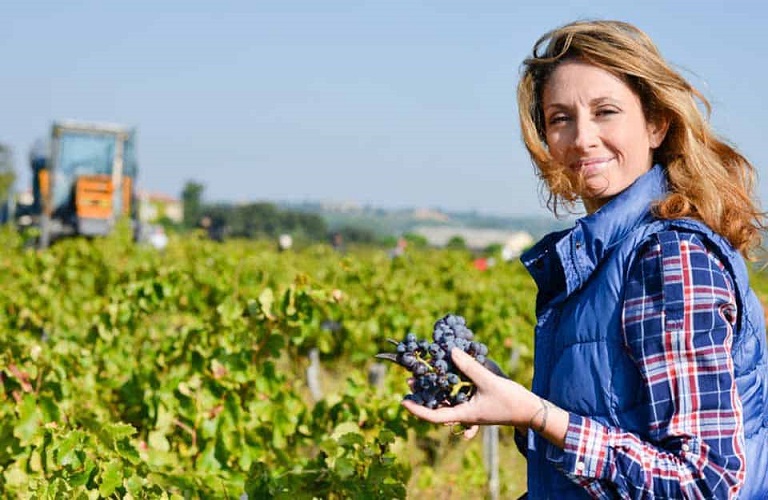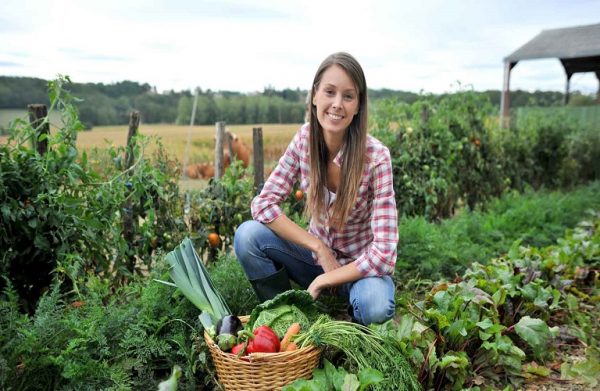
She kept the Greek countryside alive. She supported the family by working hard from scratch in the field, in the stable and in her household. She preserved folk traditions. This is the Greek female farmer of the older generations.
Today, the new female farmer – despite difficulties – is the one who adds to the above occupations the utilization of agricultural programs, actions, while innovating and evolving. She even goes a few steps further, managing agricultural land, training and upskilling, coming up with innovative ideas and implementing them.
On a more general level, women continue to play a critical role in the economic development of rural communities both in our country and at the European level. Nevertheless, although it is a key role in a farm, the phenomenon of being “invisible” has not yet disappeared, facing greater difficulties, compared to men, in terms of decision-making processes.

The Greek woman farmer
In Greece, the female farmer is called upon to support the development of the primary sector. Its contribution in this field is also recorded in the latest data available from the Ministry of Internal Affairs and Communications:
Of the 328,121 Greeks who have as their main occupation farming, 151,055 are women.
From the IACS data it appears that of the 661,815 applications made in 2022, 306,749 concern female farmers, i.e. 46.34%.
The cultivated area declared by women is 36% of the total declared area across the country.
But also in the European programs in Organic Agriculture, 37% of the beneficiaries are female professional farmers. In New Farmers 32.63%, in Equalization 54.2%, in Improvement Plans 29%, in agro-environmental 43%, in small holdings 45.4%.
In general, 53.48%, i.e. a majority, of the beneficiaries of European programs are women.
In the Agricultural Growth funding program, 53.48% are women.
A characteristic element is also that the Women’s Agricultural Cooperatives, at the beginning of 2000, amounted to 71 and according to the latest data, they are now 141, with more than 90 active, offering employment to a large number of women.
The EU is committed to improving the situation, in particular through the EU Action Plan for Rural Development, supporting the uptake of women’s entrepreneurship, women’s participation in decision-making and the provision of appropriate services in rural areas.

Female farmers in the EU
Around a third of farms across the EU are managed by women. However, only 4.2% of female farm managers are under the age of 35. The employment rate in agriculture for women remains consistently lower than for men.
Also, in addition to the reduced percentage of women engaged in agriculture, the size of farms managed by women is considerably smaller than that of men. The average farm size for farms managed by women is 6.4 hectares, less than half of the 14.4 hectares for farms managed by men.
But what can the EU do to help encourage more women to join the primary sector?
Most of the measures supported or funded by the EU aim to make agriculture more attractive to both sexes, in fact – income support for farmers, additional support especially for young farmers – while modern farming techniques – with the help of satellites and robots – also make it more attractive for everyone.
Gender mainstreaming is also addressed through the Rural Development Programs funded through the Common Agricultural Policy: EU countries are required to analyze the situation of women in rural areas and take the results of these analyzes into account when planning the programs of agricultural development.
However, the new CAP 2023-2027 focuses more on promoting women’s participation in the socio-economic development of rural areas, with particular attention to agriculture, supporting the key role of women.
Latest News

WTTC: Travel & Tourism to Create 4.5M New Jobs in EU by 2035
This year, international visitor spending is set to reach 573 billion euros, up by more than 11% year-on-year

IMF: US Tariffs Shake Global Economy, Outlook Downbeat
IMF slashes global growth forecast to 2.8% as U.S. tariffs create uncertainty and ‘negative supply shock

First Step Towards New Audiovisual Industry Hub in Drama
The project is set to contribute to the further development of Greece’s film industry and establish Drama as an audiovisual hub in the region

Airbnb Greece – Initial CoS Ruling Deems Tax Circular Unlawful
The case reached the Council of State following annulment applications filed by the Panhellenic Federation of Property Owners (POMIDA)

Mitsotakis Unveils €1 Billion Plan for Housing, Pensioners, Public investments
Greek Prime Minister Kyriakos Mitsotakis has announced a new set of economic support measures, worth 1 billion euros, aiming to provide financial relief to citizens.

Alter Ego Ventures Invests in Pioneering Gaming Company ‘Couch Heroes’
Alter Ego Ventures' participation in the share capital of Couch Heroes marks yet another investment by the Alter Ego Media Group in innovative companies with a focus on technology.

Corruption Still Plagues Greece’s Driving Tests
While traffic accidents continue to claim lives on Greek roads daily, irregularities and under-the-table dealings in the training and testing of new drivers remain disturbingly widespread

Pope Francis Died of Stroke and Heart Failure Vatican Confirms
As news of the official cause of death spread, tributes poured in from across the globe. The 1.4 billion-member Catholic Church is united in grief, remembering a pope who championed inclusion, justice, and compassion

Increase in Both Museum Visits, Revenues for 2024
As expected, the Acropolis was the top archeological site in the country, followed by Sounion, Mycenae, the ancient theater of Epidaurus, and Vergina in northern Greece

Where Greece’s Tourists Come From: A Look at 2025’s Top Visitor Markets
The United Kingdom continues to hold the top spot as the largest source of incoming tourism, with 5.6 million seats booked for Greece this summer — up 2.2% from last year. This accounts for 20% of all international air traffic to Greece














![Πλημμύρες: Σημειώθηκαν σε επίπεδα ρεκόρ στην Ευρώπη το 2024 [γράφημα]](https://www.ot.gr/wp-content/uploads/2025/04/FLOOD_HUNGRY-90x90.jpg)



![Ξενοδοχεία: Μεγάλο το ενδιαφέρον για επενδύσεις στην Ελλάδα – Η θέση της Αθήνας [γραφήματα]](https://www.ot.gr/wp-content/uploads/2025/03/Athens-hotels-90x90.jpg)
























 Αριθμός Πιστοποίησης
Αριθμός Πιστοποίησης